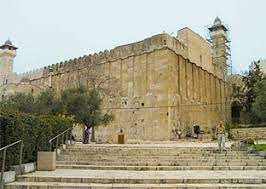
Do you ever wonder what those men are thinking when they give out chocolates to your children in shul? Do you ever ask yourself if they are unaware of the cost of dentistry? As the grandson of a dentist, I have some notion of this, yet at the same time, I am one of those men. This is your chance to hear my side of things. A month before Pesach let me share with you a chad gadya story, a cumulative shaggy dog tale – or tail, if you prefer – about Chevron.
That fact is that
today, I, Raphael D. Blumberg, am the self-proclaimed Chocolate Monster of
Hebron. But it wasn’t always that way. In fact, it involved a long process
going back to 2011, when I started going down to Chevron every day for Rabbi Uziel
Nagar’s vatikin Daf Yomi inside Me’arat
HaMachpela, the Tomb of the Patriarchs. I would like to describe that process
to you, so that perhaps you can develop some compassion for us poor Chocolate
Monsters, mere victims of circumstances, as you will see.
Stage One
Among the
fascinating people I met in the framework of participating in vatikin Daf Yomi was 90-year-old
Zechariah Nahari. For eight years, on Shabbos mornings, Zechariah and I would
walk back up the long hill from Chevron to Kiryat Arba at the end of our Daf Yomi class. All along the way, the
octogenarian Zechariah would talk to the soldiers posted en route, and to each
soldier, and every small child, he would give a piece of candy.
But Zechariah wasn’t
just dispensing candy. He was a man who had grown up in the mountains of
Northern Yemen until he was 15, dodging mountain lions and playing pranks on
Arab officials. He moved to Israel with his family just before the War of
Independence, was drafted into Israel’s fledgling army in 1950, worked as a
building contractor for 50 years, participated as a
reservist paratrooper in the Six Day War conquest of Chevron, and was involved
in the struggle to found Kiryat Arba since its very beginnings in 1971. Zechariah
was a fascinating persona with much to share. With his enormous mustache, his
imposing personality, and his stories of a different era, he was a colorful
character whom the soldiers knew and loved. And when he offered a soldier a
piece of candy, saying no was not an option. Even 22-year-old officers
ill-disposed to accepting candy gifts in front of their young conscripts had no
choice, while those conscripts giggled in the background. Who could say no to
Zechariah?
Still, as he
approached age 90, Zechariah stopped coming. A few months went by, and it began
to bother me that Zechariah’s 40-year candy tradition with the soldiers had
ceased. I wanted to fill the void or at least to try to – nobody could replace
Zechariah – so I started giving out candies to the soldiers and, talking to
them as well. I couldn’t be Zechariah, but I could try to be myself. I gave out
sweet hard candies.
Stage Two
A month after I
started that, something happened in our Daf
Yomi minyan. At Me’arat HaMachpela on Shabbos morning, there are two vatikim Daf Yomi minyanim: a Sefardic
minyan that is sort of Ashkenazic, and an Ashkenazic minyan that is sort of Sefardic.
I daven with the latter.
The Sefardim have
a colorful custom: On Shabbos morning before the sefer Torah is returned to the ark and the kehilla davens Mussaf, all the children in shul gather around the bima and sing the words, “Yimloch
Hashem le’olam Elokayich Tziyon ledor vador, Halleluka.” This line is sung twice, in a grandiose
three-quarters-time Sefardic melody. And then the chazan picks up the Torah and heads for the ark, while the children
who sang are each given a candy. Well, as I said, my Ashkenazic minyan is sort
of Sefardic. Well, a long time ago, the gabbai
decided that singing is nice and candies are nice and making children feel good
is nice, so he added this custom. And since in Chevron, for 500 years since
1530, the vast majority of the Jews were Sefardic, any time an Ashkenazic gabbai wants to adopt a Sefardic custom,
he just calls it “minhag Chevron.”
The fellow who
gave out the candies for many years was Dr. Gershon Bar-Kochba, a Chevron
resident, a colonel in the Israeli army, a graduate of the Shavei Chevron
Yeshiva, a military historian – and one of the finest orators and teachers I
have ever heard. A month after I started giving out candies to the soldiers,
Gershon made known his intention to move his family from Chevron to Samaria, a
major center of his wife’s family. There were then a number of weeks when it
was unclear if Gershon was going to make his appearance in our minyan or not.
The first week he was missing, the children came up the bima to sing Yimloch, and
there was no trace of Gershon – and no candies. The gabbai looked around tentatively and saw my transparent tallis bag with candies in it, and he
asked if I could spare some candies for the Yimloch
boys, and of course I agreed. I think there were three boys that week, and they
each received a candy.
The next week it
was thought that Gershon would return, but he did not, so I was asked again,
this time with brief eye contact from the gabbai.
The third week, without being asked, I stood up and gave out candies.
Well, in Judaism –
and out of it as well – three times is a charm, and by the fourth week I felt
that I had become the “owner” of the candy concession. Months then went by, and
I continued to give out sweet hard candies, three or four a week. But all the
while I was thinking to myself, “If it were me, is this what I would want to be
receiving?” You see, my favorite candy flavor has always been black licorice,
and as far as I was concerned, the Yimloch
boys were being deprived of what should have been rightfully theirs.
So one week, after
about three months, I instead handed out large black, individually wrapped
licorice hard candies. Bliss! I was so proud of myself. The children, as usual,
said thank you; they just looked a bit more serious than usual. I did this for
several weeks – while continuing to give out my regular sweet hard candies to
the soldiers. Why were the children so serious looking? I didn’t have a clue.
Stage Three: Reality Check
One week, I
brought my licorice candies up to the bima,
and when the children finished singing Yimloch,
they all fled the bima and walked
over to Rabbi Yisrael Lior, a regular, and the grandson of Kiryat Arba’s
Chief Rabbi, Rabbi Dov Lior. They stood in line while he gave them something
else, although I couldn’t see what – and I didn’t want to appear too
interested. As you can imagine I was troubled, but I kept my peace and with my
tail between my legs took my bag of licorice back to my seat and prepared for Shmoneh Esrei.
A few days later,
I was davening Mincha at the weekday Town Council minyan, and there was Yisrael
Lior. After Mincha I approached him and asked, “Shalom Harav Yisrael, I didn’t
understand what happened with the candies this week. Don’t the children like
the licorice candies I give out? It’s my favorite candy!” He looked at me with
a sad smile, like he didn’t want to hurt me, but then he went on: “No, Rafi,
they don’t like those candies. Not one bit.”
I was shattered,
but I recovered quickly and I asked, “So what did you give them instead that
they did like?”
“Twenty-gram
individually wrapped mini-chocolate bars, three types for their choosing.”
“Can I start
giving that out?”
“Rafi, you really
don’t have to.”
“But I want
to.”
“Well then, come
into the store with me and I’ll show you the assortment I bought.”
So from then on I
bought the three types of mini-chocolate bars, and the boys were happy again.
Stage Four
Until that moment,
I was giving out three or four candies a week. Then overnight, things began to
snowball. 1) One of the adult regulars asked if he could have a few chocolates
for his daughters, who were in the women’s section. 2) When the children got
wind of this – well, they have sisters too. 3) Up to a certain date, the Sefardic
minyan was davening inside the Me’arat HaMachpela edifice, and the Ashkenazic
minyan had decided that because of Corona they would daven outside. The moment
arrived when the Sefardic minyan was told that they would henceforth have to
daven outside as well. It was summertime, and it was decided to make one big
minyan of Ashkenazim and Sefardim, spread out, in the plaza outside the Me’arat
HaMachpela edifice. Thus, the children in the Sefardic minyan, who until that
moment had been receiving sweet hard candies, were suddenly part of our
chocolate bonanza, and were suddenly aware that they could ask for chocolates,
not only for themselves but for their sisters, too. In short, the
number of chocolates I was giving out went from four to some number beyond 15.
Stage Five:
A few months ago,
I started learning Sefat Emet with a
few pals of mine from Daf Yomi.
Yisrael Zeev of Chevron, alias Ira Farkash of Chicago, is married to Miriam,
daughter of the late Morris Rombro of Baltimore. His mechutan is Ronen Cohen. After vatikin
Daf Yomi outside the Me’ara, all three of us walk over to Ronen’s home in
the Beit Schneerson enclave of Beit Hadassah. Yisrael, who has learned Sefat Emet for many years, is the
teacher.
What does this
have to do with chocolates? Ronen, bli ayin hara, has 10 married
children, and all of the children have large families, and every week, one or
more of Ronen’s children spend Shabbos with him. When you walk into Ronen’s
apartment after Daf Yomi at about
8:30 in the morning, the first thing you notice is that the floor of the living
room is full of mattresses, where grandchildren, sometimes cousins from
different families, have been sleeping. The table is set for Sefat Emet
learning, with Johnny Walker and Southern Comfort on the table for the adults
(this is not a kiddush club! It’s not!), and a large straw basket of
the same chocolates that I give out to the Yimloch
boys, for all the grandchildren. So what happened last week? The chocolates ran
out, and somebody noticed that I still had some left over from the Yimloch boys. Somebody asked me, perhaps
a spiritual descendant of Charbona, “Rafi, can we give the children your
chocolates?” and of course I answered, “Of course! Of course! That’s what they’re
there for!” Did I say that?
So I’ve become the
Chevron Chocolate monster, or at least one of them. Next week there is supposed
to be a bar mitzvah in our minyan. You’ll have to pardon me. I’ve got to go to
the store.






